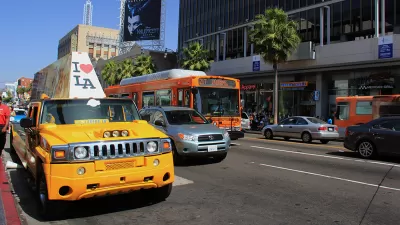LADOT is rehearsing now for the day it has to manage autonomous vehicles alongside delivery drones and air taxis.

Like other cities, Los Angeles is working to get ahead of a seeming whack-a-mole of new transportation choices by integrating them into the model of mobility as a service. In an interview with The Planning Report, LADOT General Manager Seleta Reynolds explains how the city's current initiatives—from open streets events and urban greening to Vision Zero and electrification—are laying the groundwork for the future of urban transportation.
"In my ideal vision of the future city, people have a symphony of transportation choices, such that driving alone is the choice of last resort," Reynolds explains. And in assuming the role of conductor, LADOT is partnering with a full orchestra of city departments like Cultural Affairs, Public Health, and City Planning, plus technology start-ups and more private players, to guide the distributed mobility market toward equity and social responsibility.
For instance, one of LADOT's major new initiatives is a public-private partnership, BlueLA, that provides an electric car-sharing service in low-income parts of the city. Launching the globally successful service in underserved communities before branching out across the city is an intentional strategy meant to "drive investment to neighborhoods that might not be the first in line to get these kinds of new services," Reynolds explains. She also elaborates on the city's multidisciplinary approach to its Vision Zero campaign, which tackles street improvements, art and culture, and vehicle design in an effort to eliminate traffic deaths by 2025.
The bottom line for Reynolds: "Technologies like autonomous vehicles and dockless bikeshare can be part of the solution, but only if we—government, the public sector, and the public—intentionally guide and nudge them toward the future that we want."
FULL STORY: A Symphony of Transportation Choices: LADOT GM Seleta Reynolds' Composition

Maui's Vacation Rental Debate Turns Ugly
Verbal attacks, misinformation campaigns and fistfights plague a high-stakes debate to convert thousands of vacation rentals into long-term housing.

Planetizen Federal Action Tracker
A weekly monitor of how Trump’s orders and actions are impacting planners and planning in America.

San Francisco Suspends Traffic Calming Amidst Record Deaths
Citing “a challenging fiscal landscape,” the city will cease the program on the heels of 42 traffic deaths, including 24 pedestrians.

Defunct Pittsburgh Power Plant to Become Residential Tower
A decommissioned steam heat plant will be redeveloped into almost 100 affordable housing units.

Trump Prompts Restructuring of Transportation Research Board in “Unprecedented Overreach”
The TRB has eliminated more than half of its committees including those focused on climate, equity, and cities.

Amtrak Rolls Out New Orleans to Alabama “Mardi Gras” Train
The new service will operate morning and evening departures between Mobile and New Orleans.
Urban Design for Planners 1: Software Tools
This six-course series explores essential urban design concepts using open source software and equips planners with the tools they need to participate fully in the urban design process.
Planning for Universal Design
Learn the tools for implementing Universal Design in planning regulations.
Heyer Gruel & Associates PA
JM Goldson LLC
Custer County Colorado
City of Camden Redevelopment Agency
City of Astoria
Transportation Research & Education Center (TREC) at Portland State University
Jefferson Parish Government
Camden Redevelopment Agency
City of Claremont





























